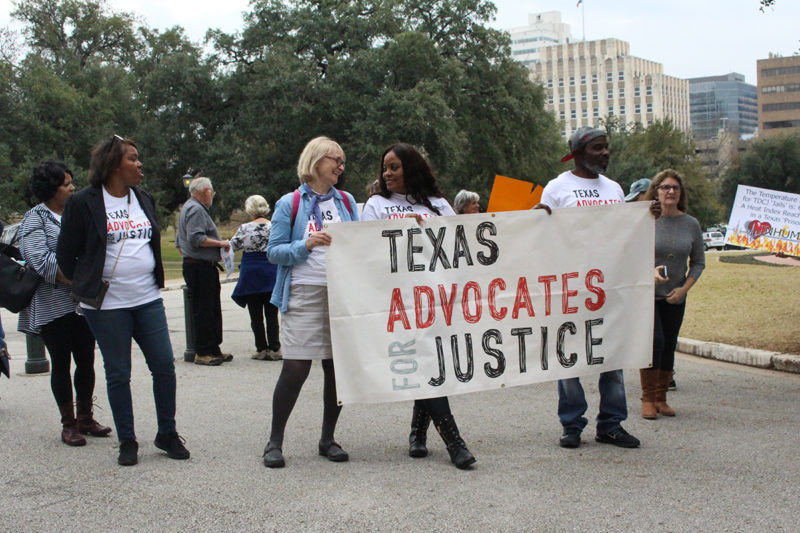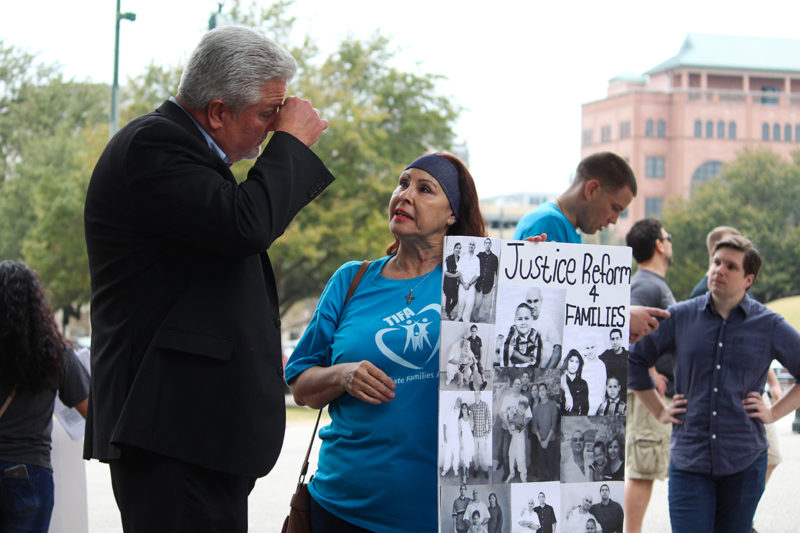Advocates Push for Criminal Sentencing Reform
By Jack Keyes
Reporting Texas

Members and supporters of Texas Advocates for Justice, a program bringing together families affected by mass incarceration, unite at the Texas Inmate Families Association Rally at the state Capitol in Austin, Texas. Cristina Pop/Reporting Texas
Sara Holder made the trek to Austin from her West Plano home in early February to join a rally for prison reform on the steps of the state Capitol organized by the Texas Inmates Families Association. Her son Ethan’s homemade sign underscored their personal stake in the issue: “I want my daddy home,” it read.

Ethan Holder, 9, presents two signs at the Texas Inmate Families Association Rally. Cristina Pop/Reporting Texas
Jason Holder, Ethan’s stepfather, married Sara last October. In 2011, the state of Texas sentenced Holder to 25 years in prison for shooting and killing a North Dallas man following an argument over stolen property, Sara says. Now, Sara is supporting legislation that could shorten his sentence.
The bill, which state Rep. Senfronia Thompson, D-Booth, filed in January, would allow prisoners, even those convicted of violent crimes, to reduce their sentences through good behavior. Thompson says President Donald Trump’s recent approval of federal prison reform could create momentum for similar changes in the Lone Star State. Thompson’s bill was granted a hearing by the House Corrections Committee on Feb. 27.
“Credits for parole eligibility are granted in other states, and have been boosted through the recent federal legislation known as the First Step Act,” Thompson said in a statement released in March. “Texas is a leader when it comes to criminal justice reform and I would like to show the rest of the nation that a program such as this one can be done safely and intelligently.”
On Dec. 18, 2018, Trump signed into law the FIRST Step Act, which could allow thousands of prisoners serving at the federal level to earn an earlier release from prison. Trump was quoted as saying he wants “criminal justice reform, Texas style,” referring to the costs the state has been able to save while still keeping its tough-on-crime reputation.
In 2007, conservative Texas lawmakers passed legislation that reduced low-level offenders’ incarceration rates at the state level and offered educational opportunities to inmates in an effort to reduce recidivism. The move saved the state from spending $2 billion on the 17,000 prison beds that would have been needed without reform.
Now, Texas Democrats hope to find further common ground between the social justice-seeking left and the fiscally conservative right. Texas leads the nation with 250,000 of its residents behind bars, about 9,000 more than second-place California. The politics of reducing prisoners’ sentences will be a challenge for the Republican-dominated Texas Legislature, but with each Texas prisoner costing the state $50 a day, Thompson’s Earned Time Credit bill could save the state millions.
“Back in the 1980s and 1990s, prison expansion was determined to be the solution to the higher crime rates and lack of employment opportunities in Texas,” said Lauren Oertel, Texas Inmates Families Association director of organizational strategies. “Over the last decade or so, legislators have learned that this was a mistake, and have recently been working on reversing our mass incarceration issues.”

Family members and allies gather at the south steps of the Texas Capitol on Monday, Feb. 4, 2019, in support of a new bill advocating for inmates’ rights. Texas has the fourth highest incarceration rate in the country. Cristina Pop/Reporting Texas
Thompson’s Earned Time Credit bill calls for even the most serious offenders to receive up to 15 days in reduced time for every month they serve in prison, provided they are on good behavior and enter rehabilitative programs. The bill would be retroactive, potentially resulting in the release of thousands of Texas prisoners.
Marc Levin, vice president of criminal justice policy for the conservative criminal justice reform group Right on Crime, supports the legislation. “Over time I think we’ve realized that a number of the sentences were longer than someone might get now,” Levin said.
While reducing prison terms may appeal to those on the fiscal right, some social conservatives take issue with the bill’s retroactive provision. “It’s problematic for a good percentage of victims’ families who agreed to a contract with the prosecutor and the defendant when the sentence was agreed upon,” said Andy Kahan, director of victim services and advocacy for the Houston Crime Stoppers.
Michele Deitch, a senior lecturer at the University of Texas at Austin’s School of Law who specializes in criminal justice, is confident about the bill’s chances. “The Legislature in recent years has become much more aware of the fact that the system is overcrowded and that there are a lot of people incarcerated who don’t need to be there,” Deitch said.
Sara Holder took the day off from her banking job to attend the Texas Inmates Families Association’s rally and spent hundreds of dollars on gas and a two-night hotel stay. She said the sacrifice will be worth it if it brings her family a step closer to being reunited.
“It would be huge if my husband got to come home,” Holder said. “That would flip my world upside down.”